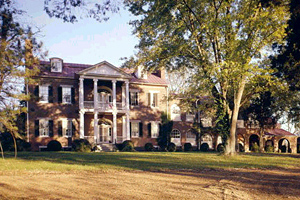
Fairvue Plantation
Fairvue was the home of Isaac Franklin and his young bride, Adelicia Hayes Franklin. Built in 1832, the property was designated as a National Historic Landmark in 1977, but lost the designation in 2005.
Historically, the house had identical facades facing east and west situated at a ninety-degree angle to the Nashville-Gallatin Turnpike, in which Franklin was an original stockholder. The four-over-four-room house had a central hall and double portico in the Ionic style. A finished third floor attic extended the length of the house. Elliptical fan windows over the doors reflect some of the many Federal construction details. In 1839, the year the Franklins married, a south wing consisting of seven rooms was added to the original structure. On the opposite side of the house, an octagonal brick wall enclosed a garden with an ice house in the center. Fairvue was a 2000-acre working plantation devoted to cattle and thoroughbred horses. It included extensive stables and a training track. Brick slave quarters, an overseer’s house, and blacksmith shop still remain.
In 1846 Isaac Franklin died. His will set up trusts for his children and provided for his wife until such time she might remarry, at which time Fairvue would become a private school, endowed by his vast Louisiana holdings. In 1849, after marrying Joseph Acklen, Adelicia Franklin Acklen contested the will before the Louisiana Supreme Court, which declared it void and of no force. Without funding, the school never formed, and the house remained vacant during the Civil War.
In 1869 Adelicia Acklen purchased the property from John Armfield, the executor of Franklin’s estate. In 1882 she sold the property to Charles Reed of New York. Reed spent two hundred thousand dollars restoring Fairvue as a fine home and horse-breeding establishment. By 1897 Fairvue had approximately 150 brood mares. Reed sold the property in 1908, and Fairvue had a succession of owners until 1929. Two weeks before the stock market crash, the Sumner County Land Company, a division of Southland Grasslands Hunt and Racing Foundation, purchased Fairvue and eighty other farms to build a fox hunting and steeplechase course. The project was ill timed, and the new owners declared bankruptcy in 1932. William Hatch Wemyss, a cofounder of Jarman Shoe Company, saved Fairvue when he purchased the property in 1934. In 1939 Wemyss married Ellen Stokes Moore, and she began the restoration of Fairvue.
In 1956, 320 acres of Fairvue Farms were flooded by Old Hickory Dam, leaving the house on a peninsula. In 1999-2000 developers acquired the remaining property and announced that a luxury lakefront community, complete with a golf course and other amenities, would replace most of the plantation’s landscape and that Fairvue would be transformed from a private residence to a clubhouse for the development. Construction of roads and the selling of house sites were underway in 2000. By 2019, over 400 houses and a golf course had been built on the former Wemyss estate.
In 2005, the National Historic Landmarks program of the National Park Service determined that Fairvue bore little resemblance to its historic use as an antebellum southern plantation. The area surrounding the house had been developed with houses and other facilities placed directly adjacent to and interspersed within the property’s historic main house and outbuildings. Because of alterations to the main house itself, it no longer conveyed its historic association as an antebellum plantation home. A one-story addition built on the southeast corner of the rear (east) elevation, the introduction of new woodwork and drywall, the widening of doorways, and the retrofitting of the southern section of the house with a modern interior layout, all contributed to the mansion’s loss of integrity. In addition, the homeowner replaced original windows and shutters with fiberglass replicas of the originals while windows were installed in the previously open south end of the loggia. National Historic Landmark designation for Fairvue was withdrawn on April 4, 2005.
From 2015 to 2018, the much altered Fairvue house was offered for sale as a single-family home with 12.8 acres, but was removed from the market in August 2018.



